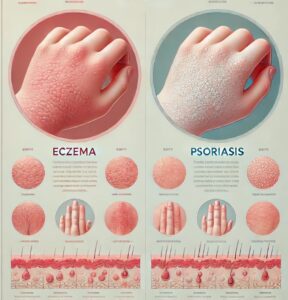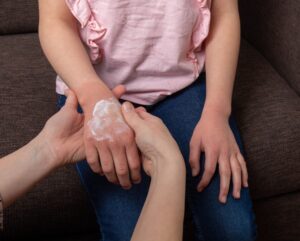What Is Eczema?
Eczema, also known as atopic dermatitis, is a common chronic skin condition that often affects infants, children, and adolescents. It can be persistent and prone to flare-ups, which can disrupt daily life. This condition is deeply linked to individual genetic factors and family history. For example, a child who suffers from eczema is more likely to develop related conditions such as asthma or allergic rhinitis. In fact, it’s not uncommon for one or more of these conditions to occur together.
Causes of Eczema Flare-Ups:
Eczema flare-ups can be triggered by various factors, which can make it challenging for parents to manage. Here are some of the most common causes:
- Skin contact with irritants: Bath soaps, laundry detergents, and certain fabrics in clothing can irritate the skin, causing flare-ups.
- Dietary triggers: Certain foods may trigger eczema in children. Common culprits include dairy, eggs, and nuts.
- Weather changes: Dry weather, cold winters, and hot, humid climates can aggravate eczema symptoms.
- Bacterial infections: Skin infections, such as those caused by Staphylococcus bacteria, can worsen eczema.
Symptoms of Eczema:
Eczema symptoms vary depending on the age and skin type of the child. Here are some common signs to look for:
- Dry, cracked skin
- Itching (pruritus)
- Rash with swelling: The color of the rash can vary depending on the child's skin tone.
- Raised bumps on brown or black skin
- Oozing and crusting
- Thickened skin
- Darkening around the eyes
- Skin sensitivity after scratching
Symptoms of Eczema at Different Stages:
- In Infants: The first signs of eczema often appear within the first few months of life. Babies usually develop a rash on their face, scalp, arms, legs, back, and chest. The rash may be itchy, leading to oozing and crusting.
- In Older Children and Adolescents: For children over two years of age, eczema tends to appear on areas like the back of the elbows, behind the knees, wrists, neck, or ankles. These areas may become scaly and dry.
How Is Eczema Treated?
While eczema is a chronic condition, it can be managed with the right care and treatments. Here are the key steps to treating and managing eczema:
- Moisturize Daily: Since eczema damages the skin's ability to retain moisture, daily moisturizing is crucial. Use fragrance-free, hypoallergenic lotions or creams to help lock in moisture.
- Avoid Allergens: Keep track of common triggers like dust mites, pet dander, certain foods, and environmental allergens. Create an allergen-free environment to minimize flare-ups.
- Anti-itch and Anti-inflammatory Treatments: Corticosteroid creams or ointments can be used to relieve itching and reduce inflammation. Apply these products at the first sign of itching to prevent worsening symptoms.
- Antibacterial Ointments: In cases where eczema becomes infected, antibiotic ointments like mupirocin can help reduce infection and alleviate itching. In more severe cases, oral antibiotics may be needed.
Additional Tips for Managing Eczema in Children
Managing eczema in children requires patience and consistency. Parents should create a daily skincare routine that includes moisturizing, using gentle skincare products, and avoiding triggers. Remember, it’s important to follow a healthcare provider’s advice for the best possible treatment outcomes.
FAQs About Eczema in Children
1. What causes eczema in children?
Eczema is caused by a combination of genetic and environmental factors. Children with a family history of eczema, asthma, or allergies are more likely to develop eczema. External factors such as irritants, allergens, and weather conditions can also trigger flare-ups.
2. How can I prevent my child’s eczema from getting worse?
To prevent eczema flare-ups, avoid known triggers, moisturize your child’s skin regularly, and use gentle, fragrance-free skincare products. It’s also helpful to keep your home free of allergens like dust mites, pet dander, and mold.
3. Can food allergies cause eczema in children?
Yes, food allergies are a common trigger for eczema flare-ups in some children. Foods such as dairy, eggs, peanuts, and wheat can cause allergic reactions that worsen eczema symptoms. It’s important to consult a doctor or allergist for proper diagnosis.
4. Can eczema go away as my child gets older?
Eczema symptoms can improve over time, especially as a child’s immune system matures. However, for many children, eczema remains a lifelong condition that may come and go. Ongoing management can help control flare-ups.
5. Is it safe to use steroids for treating eczema in children?
Corticosteroid creams and ointments are commonly prescribed to treat eczema flare-ups. When used under the guidance of a healthcare professional, they are generally safe and effective. Be sure to follow instructions to avoid side effects from prolonged use.
Final Thoughts
Managing eczema in children requires careful attention and consistent care. While eczema can’t be cured, it can be controlled with the right approach. By moisturizing regularly, avoiding allergens, and following a treatment plan provided by your child’s healthcare provider, you can reduce flare-ups and improve your child’s quality of life. Patience is key in managing eczema effectively. Always consult with a doctor to develop a personalized care plan that works best for your child’s unique needs.
References:
- WebMD: “Eczema in Children: Symptoms, Causes, and Treatment.”
- HealthyChildren.org: “Atopic Dermatitis (Eczema) in Children.”
- Dr. Huang Yingning, Healthy Parenting Guide for Eczema Care.













